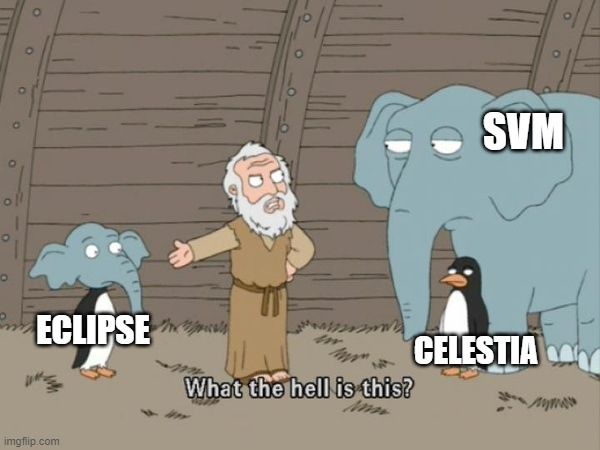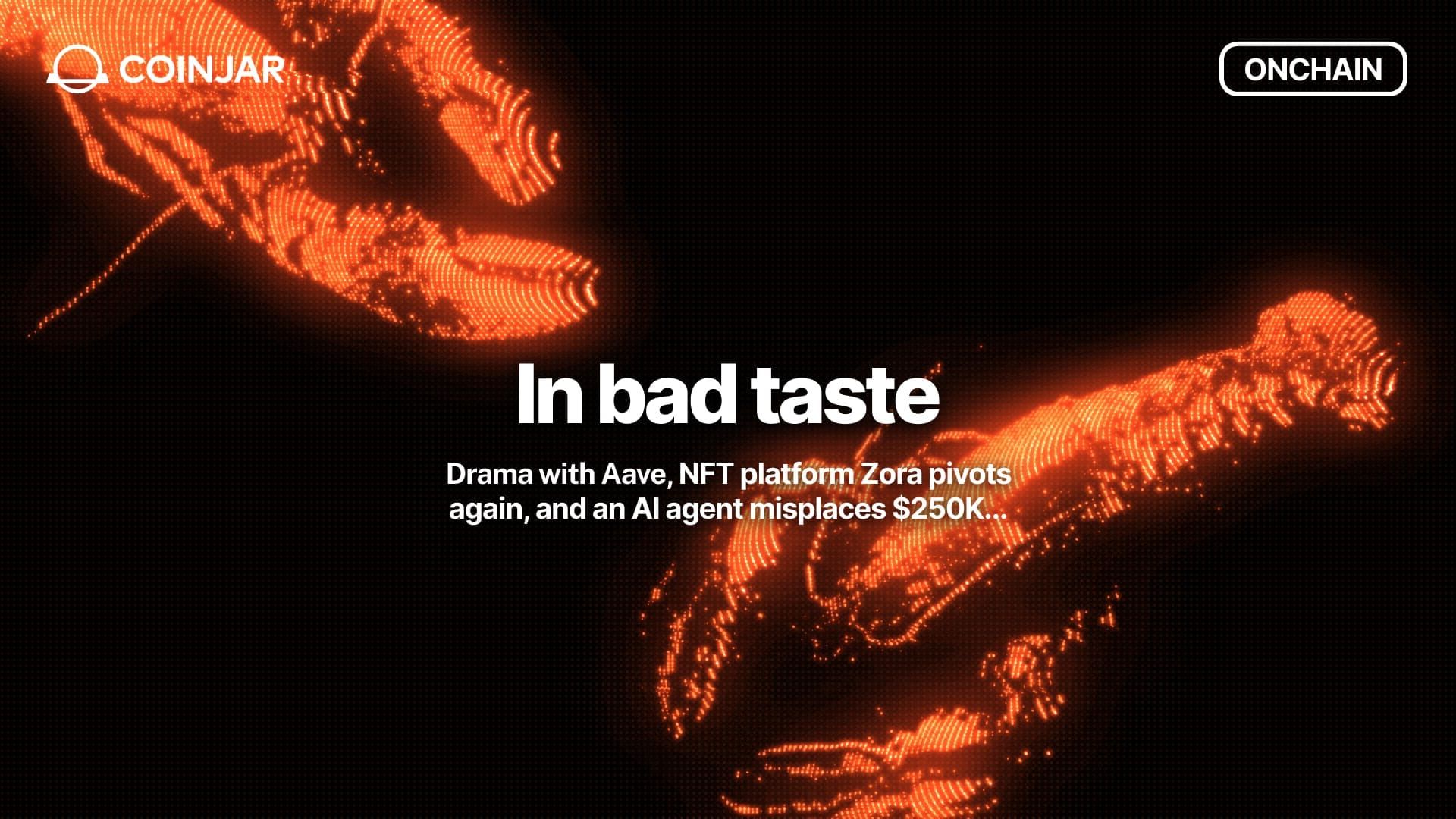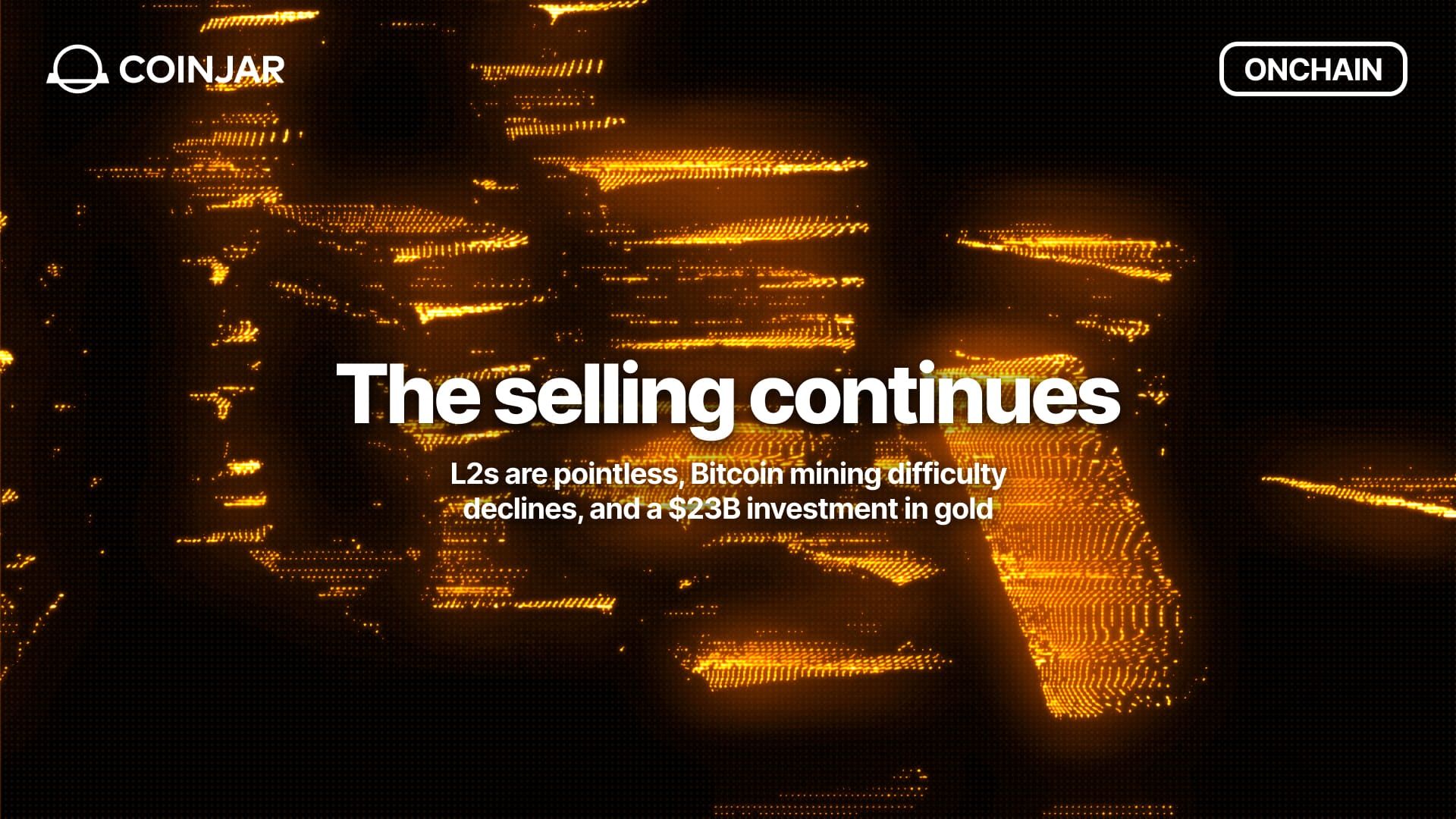Onchain: SBF guilty, Aragon DAOn, and an L2 boom and bust
November 8, 2023
Share this:

Story One
SBF guilty
Sam Bankman Fried, also known as the guy who ruined the reputation of Effective Altruism for the foreseeable future, has been found guilty on seven criminal counts, including wire fraud, commodities fraud, and money laundering. This verdict probably doesn't come as a surprise to anyone who's followed the trial where his ex-girlfriend dropped some bombshells, such as FTX working with Thai prostitutes and bribing Chinese government officials. These are just examples of various terrible business decisions Sam made under the banner of his crooked idea of utilitarianism. Ultimately, the FTX collapse will go into the history of crypto as one of the biggest frauds in the industry, with losses in the billions. Let's not talk about the further distrust in the public it has instilled.
On that note, at least the U.S. attorney had a more nuanced view, stating that the industry might be new, but the crime wasn't. Lying, stealing, and cheating are all crimes with long-standing history.

Takeaway: The biggest irony is, once again, that crypto already has the tools to prevent fraudulent balance sheets. It's putting businesses on chain or using onchain proofs.
Story Two
Aragon DAOn
The Aragon Association, the governing body of the aragonOS software, a set of tools to create DAOs, has announced that it's shutting down operations and re-grouping. As part of the process, they'll distribute over 86k ETH, roughly $115 million, to the ANT token holders.
Aragon had seen a lot of turmoil in recent months after the team failed to empower its token holders with voting rights on the use of treasury funds. Despite a vote in favor of it last year, during the transition period, the team first delayed the process, only to then abandon the idea completely in light of a "51% attack". This supposed attack was run by a group calling themselves risk-free value raiders who realized that the market cap of the ANT token was lower than the value held in the treasury.
According to their math, if the raiders managed to vote for a payout or dissolution of the funds, they'd be able to capture the difference in value. In the end, even though that first attempt failed, Aragon's DAO ambitions were shut down for now, and the core product team shared that they'd continue working in a more product-focused structure.
Takeaway: DAOs are complicated, and making votes purchasable can have some adverse outcomes. It'll be interesting to see if similar attacks occur in the future whenever a DAO has failed to gain significant traction, yet the market cap of its governance token is below the value of its treasury. 👀
Story Three
L2 boom and bust?
2023 has truly been the year of Layer 2s, from living a more niche existence to becoming the quickest hack for hype and VC funding (before AI came along.) For a while, it seemed everyone was either launching new Layer-2s or transitioning their existing L1 chains to L2s to stay relevant. And then we even started seeing things like Eclipse: an L2 that uses Solana's Virtual Machine and Data Availability from Celestia, winning the contest for buzzword heaviest rollup.

Even though L2s now have a scaling factor of 5x, meaning that they have increased transactions that eventually settle on Ethereum 5-fold, activity on them is starting to die down. In the past six weeks, overall L2 activity is down 32%, with Ethereum mainnet reclaiming some of its dominance.
The pattern on most L2s is pretty clear. A flurry of initial high activity is followed by a cool-down period where people realize that maybe there won't be an airdrop (Base) or that it's simply not worth the hassle going there when you can achieve what you want more easily elsewhere (Ethereum mainnet).
Takeaway: With so many L2s around, the question starts to arise: when do we have enough, and why would anyone even care when there's so little differentiation? In the end, they all make transaction fees cheaper.
Fact: If you think that all of web3 is a little nuts, you'd be right. But if you believe that all the things we call nuts are actual nuts, you're not. Walnuts, Peanuts, and Pistachios all technically aren't. Walnuts are seeds, and so are Pistachios. Peanuts, even more strangely, are classified as legumes because they grow underground. 🥜
Naomi from CoinJar
The above article is not to be read as investment, legal or tax advice and takes no account of particular personal or market circumstances; all readers should seek independent investment, legal and tax advice before investing in cryptocurrencies. This article is provided for general information and educational purposes only. No responsibility or liability is accepted for any errors of fact or omission expressed therein. CoinJar, Inc. makes no representation or warranty of any kind, express or implied, regarding the accuracy, validity, reliability, availability, or completeness of any such information. Past performance is not a reliable indicator of future results.
Share this:
On/Offchain
Your weekly dose of crypto news & opinion.
Join more than 150,000 subscribers to CoinJar's crypto newsletter.
Your information is handled in accordance with CoinJar’s Privacy Policy.
More from CoinJar Blog

Onchain: In bad taste
February 25, 2026ICYMI, the tech bros have once again discovered taste, so get ready to be lectured by dudes who think it's acceptable to live with one ceiling light on what to wear and consume....Read more
Onchain: The selling continues
February 11, 2026Until morale improves, or so I hope. Story One L2s are pointless Tweets the guy who advocated for them as part of the Ethereum scaling roadmap. Perhaps to deflect from his...Read more
Onchain: Lots of things on sale
January 28, 2026Story One Crypto Social for Sale Been an interesting time to observe what happens to the still-standing crypto social networks. Aave, a leading DeFi protocol and creator of...Read moreYour information is handled in accordance with CoinJar’s Privacy Policy.
Copyright © 2025 CoinJar, Inc. All rights reserved.
CoinJar, Inc. is a registered Money Services Business with FinCEN and licensed as a money transmitter, NMLS #2492913. For a list of states in which CoinJar, Inc. is licensed or authorized to operate, please visit here. In certain other states, money transmission services are provided by Cross River Bank, Member FDIC.
This site is protected by reCAPTCHA and the Google Privacy Policy and Terms of Service apply.